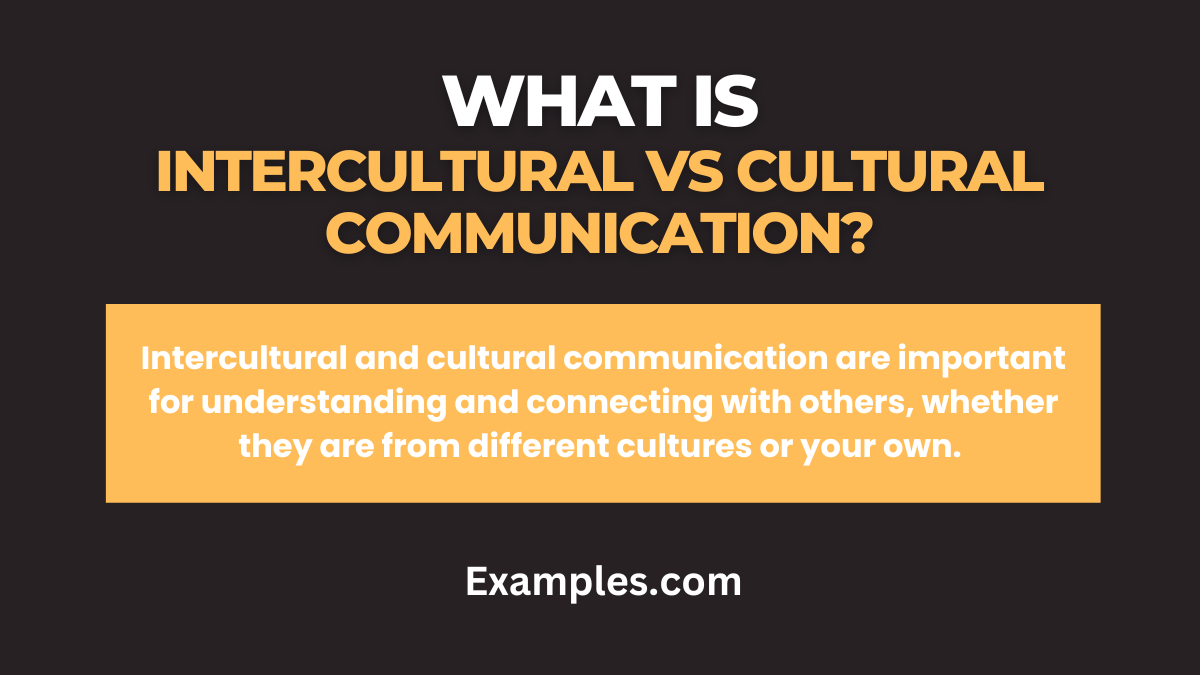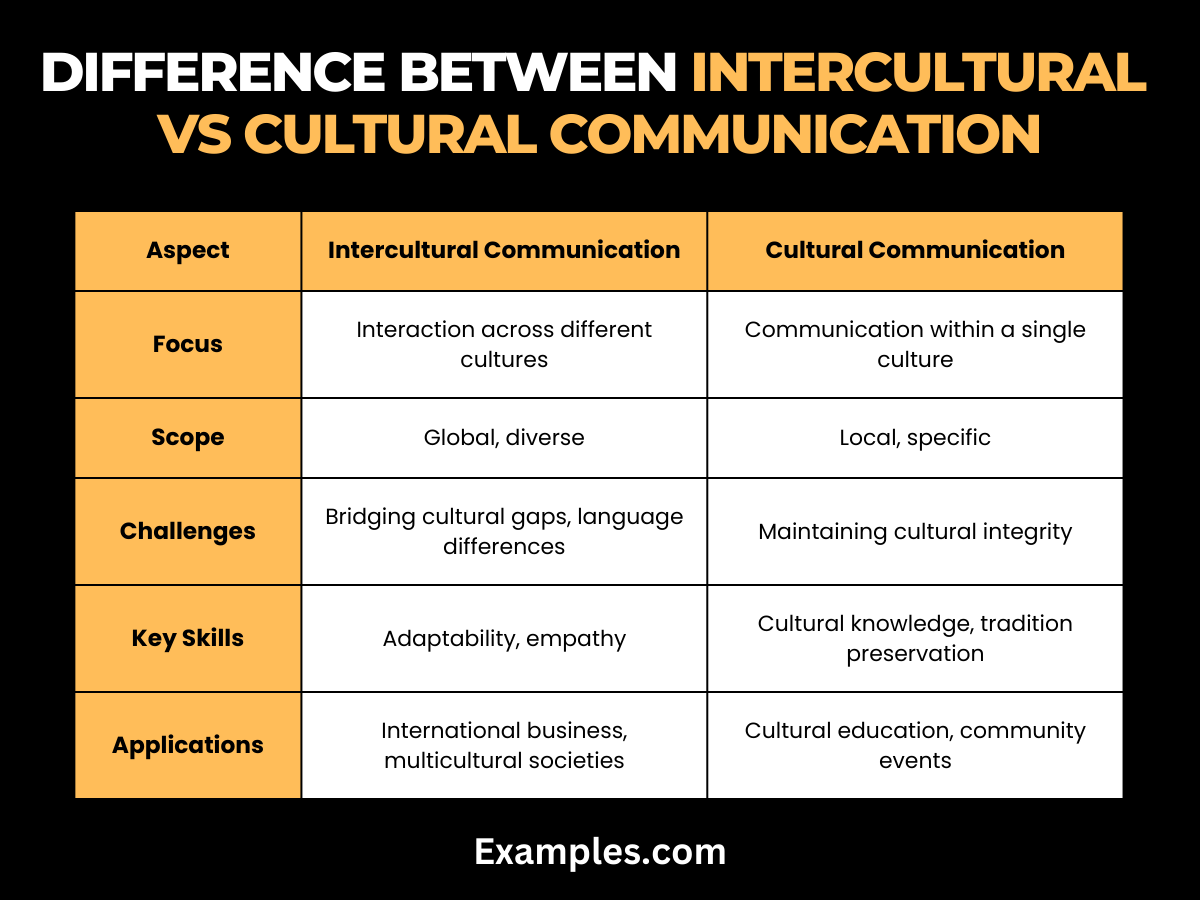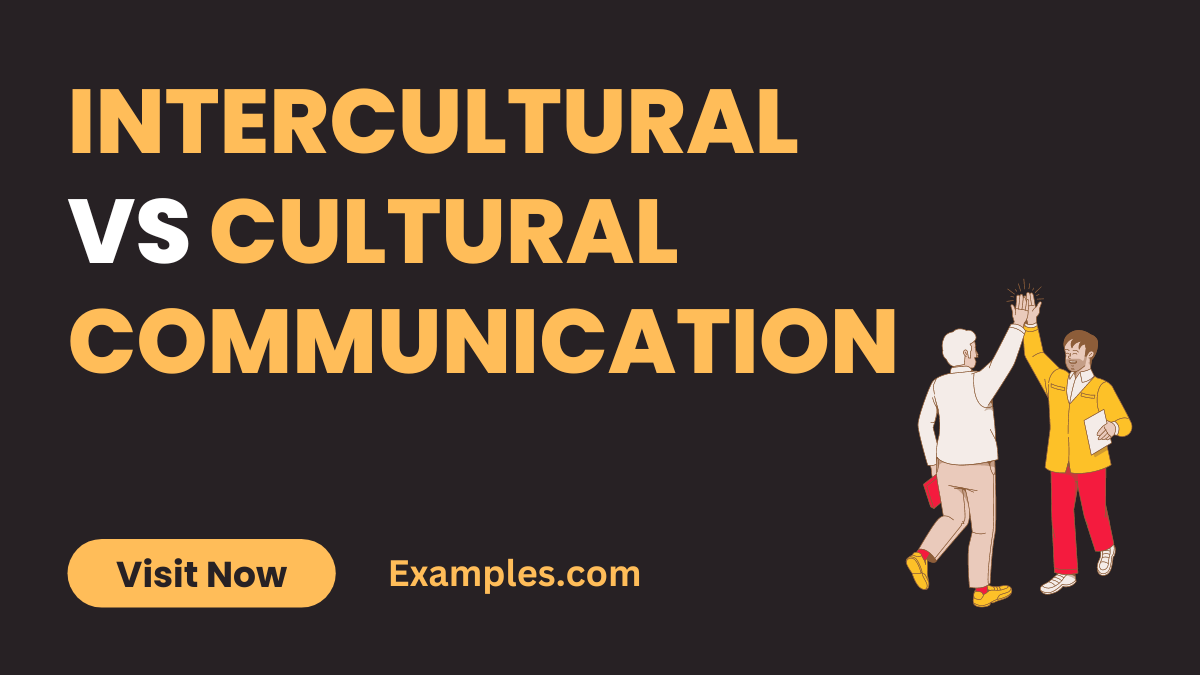Intercultural vs Cultural Communication: Difference b/w, Comparison b/w, PDF
Navigate the intricate world of Intercultural vs Cultural Communication with this detailed guide, packed with engaging Intercultural Communication Examples. Whether you’re a global professional, an educator, or simply keen on understanding the nuances of communicating across cultures, this guide offers rich insights and practical sentence examples. It’s tailored to enhance your communication skills, deepen your cultural understanding, and equip you with the tools to thrive in diverse communicative settings. Embrace the art of effective communication in our multifaceted world.
What is Intercultural vs Cultural Communication?

Intercultural communication is about how people from different cultural backgrounds share information and understand each other. It’s about learning to communicate effectively with people who have different ways of living and seeing the world. This type of communication is key when people from various countries or cultures work together or meet.
Cultural communication, on the other hand, refers to how people within the same culture talk and interact with each other. It’s about understanding the shared beliefs, values, and practices that shape how people in the same cultural group communicate.
Both intercultural and cultural communication are important for understanding and connecting with others, whether they are from different cultures or your own. They help us to communicate better in a world full of diverse people and perspectives.
Difference Between Intercultural vs Cultural Communication
Understanding the distinction between Intercultural Communication and Cultural Communication is essential for navigating the complexities of modern communication dynamics. Below is a comparison table highlighting the key differences between these two concepts:

| Aspect | Intercultural Communication | Cultural Communication |
|---|---|---|
| Definition | Involves interactions between people from different cultural backgrounds, focusing on understanding and bridging cultural differences. | Relates to communication within a single culture, emphasizing the norms, values, and practices of that specific culture. |
| Scope | Broader and more dynamic, encompassing cross-cultural interactions. | More specific, often confined to a particular cultural group. |
| Primary Focus | Understanding diverse cultural perspectives, Cross Cultural Communication, and managing cultural diversity. | Conveying and reinforcing cultural norms and values within a specific cultural group. |
| Challenges | Cultural misunderstandings, language barriers, and different communication styles. | Preserving cultural integrity and avoiding cultural erosion. |
| Key Components | Intercultural Communication Skills, Intercultural Competency, adaptation to various cultural contexts. | Cultural expressions, traditions, and intra-cultural understanding. |
| Importance | Crucial in global interactions, such as Intercultural Communication in the Workplace, international business, and multicultural societies. | Vital for maintaining cultural heritage, identity, and community cohesion. |
| Strategies for Improvement | Developing Intercultural Communication Strategies and Competency, learning about different cultural norms. | Fostering a deep understanding and respect for one’s own culture, promoting cultural traditions and practices. |
10 Examples of Intercultural Communication Skills
Intercultural communication plays a pivotal role in our globalized world. Here are ten examples showcasing the richness of Intercultural Communication:
- International Business Negotiations: Professionals from different countries discussing contracts, requiring understanding of each other’s cultural business etiquettes.
- Diplomatic Engagements: Diplomats from various nations discussing international policies, emphasizing cultural sensitivity and protocol awareness.
- Multicultural Team Projects: Teams with members from diverse cultures working together, adapting to different communication styles and work ethics.
- Study Abroad Programs: Students studying in foreign countries, adapting to local academic cultures and social norms.
- Global Virtual Meetings: Online meetings with participants from around the world, requiring clarity and consideration of different time zones and cultural backgrounds.
- Tourist and Local Interactions: Tourists interacting with locals, navigating language barriers and cultural practices.
- Expatriate Assignments: Employees relocated to a foreign country for work, adjusting to a new cultural environment.
- Intercultural Therapy Sessions: Therapists and clients from different cultural backgrounds, focusing on culturally sensitive counseling.
- Cross-Cultural Marketing Campaigns: Creating marketing strategies that appeal to diverse cultural groups, understanding varied consumer behaviors.
- International Film Festivals: Filmmakers and audiences from around the world sharing and discussing diverse cinematic cultures.
10 Examples of Cultural Communication Skills
Cultural communication focuses on interactions within a specific cultural context. Here are ten examples that highlight aspects of Cultural Communication:
- Community Festivals: Local festivals celebrating cultural traditions, with shared understanding of rituals and customs.
- Regional Sporting Events: Sports events where fans and players share regional cultural ties and camaraderie.
- Local Political Campaigns: Politicians addressing constituents, using language and references familiar to the local culture.
- Native Language Literature Classes: Teaching literature in native languages, exploring themes relevant to the local culture.
- Family Gatherings: Family members following specific cultural traditions and communication norms during gatherings.
- Workplace Culture in Local Companies: Employees adhering to a company’s culture that reflects local societal norms.
- Neighborhood Meetings: Residents discussing community issues, sharing a common cultural understanding of the local area.
- School Education Systems: Educational content and methods that reflect the cultural standards and values of the region.
- Local Art Exhibitions: Artwork reflecting the local culture, understood and appreciated by residents with shared cultural background.
- Cultural Food Practices: Cooking and eating habits in families or communities that reflect their specific cultural heritage.
Relationship Between Intercultural vs Cultural Communication
Understanding the relationship between Intercultural Communication and Cultural Communication is pivotal in grasping the broader context of communication in today’s diverse world. Although distinct, these two forms of communication are intrinsically linked, each playing a vital role in how we interact and understand each other within and across cultures.
Intertwined Nature of Intercultural and Cultural Communication
- Foundational Role of Cultural Communication: Cultural Communication forms the bedrock upon which Intercultural Communication builds. It encompasses the norms, values, and practices unique to a particular culture. By understanding one’s own culture, individuals are better equipped to engage in Intercultural Communication. This deep-rooted understanding of one’s culture, including its Intercultural Communication Methods and practices, provides the necessary context for engaging with other cultures.
- Expansion through Intercultural Communication: On the other hand, Intercultural Communication expands beyond the confines of a single culture, promoting understanding, respect, and cooperation among people from diverse backgrounds. This form of communication is not just about negotiating cultural differences but also about recognizing and appreciating the richness and diversity of various cultural expressions.
Complementary Dynamics
- Learning and Adaptation: A key element in the relationship is the process of learning and adaptation. Intercultural Communication often involves a level of cultural flexibility and adaptability, skills honed through an understanding of one’s own cultural communication. This learning process is vital in developing Intercultural Competency.
- Mutual Enrichment: Both forms of communication contribute to mutual enrichment. While Cultural Communication strengthens the understanding and appreciation of one’s cultural heritage, Intercultural Communication fosters a broader perspective, enabling individuals to appreciate the interconnectedness of the global community.
Interdependence in Various Contexts
- In the Workplace: In contexts like Intercultural Communication in the Workplace, the interplay between these two forms of communication becomes evident. Employees bring their cultural communication styles and values into the workplace, where they must adapt and engage with others from different backgrounds, utilizing Intercultural Communication Skills.
- In Education: The relationship is also significant in educational settings. While students learn about their own culture, they are simultaneously exposed to different cultures, enhancing their Intercultural Communication Competence.
- In Global Challenges: Addressing global challenges requires a blend of both cultural and intercultural communication. Understanding specific cultural nuances and perspectives (Cultural Communication) is as essential as facilitating dialogue and solutions between different cultures (Intercultural Communication).
In conclusion, the relationship between Intercultural Communication and Cultural Communication is complex yet complementary. While they focus on different aspects of human interaction, they are interconnected and equally important in fostering a comprehensive understanding and effective communication in our increasingly interconnected world.



